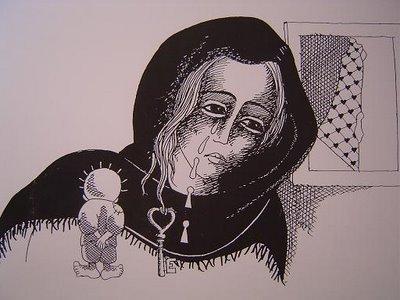
This photo is of Ahmed, who's family hosted me in Ramallah, and his mother, a survivor of the 1948 ethnic cleansing that created Israel.
Ahmed translated as we interviewed his mother today about this horrific period. She is normally an amazingly cheerful person, and greets me with energetic smiles and lots of happy welcomes ("Ahlan wa sahlan!") whenever I enter the room. But as she described 1948, her expression changed to the one you see in this photo, and stayed that way. Ahmed, for his part, is one of the most positive, hard-working, cheerful and sweet people I have met. He is now the city director of Ramallah, the acting capitol of the West Bank. I would never have guessed that such a person spent two and a half years in an Israeli prison as a young adult, never accused of any crime except "being active." But that's another story...
I taped the interview and will edit it and share it sometime publicly. In short, Ahmed's mother is from a village called Abu Shusha, which was attacked by the Haganah on, I think May 14th 1948, just before Israel announced itself as a country. The Haganah was the Zionist colonists "army" that later became the Israeli army. She described how the Haganah tried to enter the village three times but was repelled by armed resistance from the village. Finally, the village was occupied. Seventy two men were killed in a massacre, including three of her brothers, who were dragged through the streets. The village was cleared of all men, and those who were not killed fled or escaped. For a time, it was only women and children there, living under the Haganah's control. Then, the Haganah gathered everyone together and told to leave - they were to go to the next village on foot. As the villagers left, the Haganah fired shots in the air to frighten them and make sure that they understood they could not return. When they arrived in the next village, it was already empty... the residents had fled fearing a massacre like what happened in Abu Shusha.
They continued up into the hills toward Ramallah, sleeping under the trees. Finally, her family arrived in Ramallah, where the Jordanians were in control. The family started their lives over, having lost three sons and one wounded. Since then, they have endured another 39 years of Israeli military occupation after the West Bank was conquered. Today, she lives in a nice house with her son, who is Ramallah's city director (Ramallah was given some very limited autonomy in the mid-90s, but continues to be raided and occupied by Israel). But in spite of her relatively comfortable situation, especially compared to the refugees who still live in camps, she wants to return to her land. She says in conclusion, " I don't want this big house. I want to live in my home, where it's green and there are trees. This is my wish for my children and grandchildren."
Ahmed told me that his mother often cries when watching the news about Lebanon. I asked her what she thought of the situation, and she said that seeing the refugees reminded her of 1948, and she felt so sorry for them.
Abu Shusha is one of about 400 Palestinian villages destroyed to make way for Israel in 1948 (Palestinians Muslims and Christians were a 2/3rds majority before the war). Just as most cities in the United States are built over the ruins of a Native American settlements (which were permanent, not nomadic, by the way), most Israeli cities are built over Palestinian villages. Many of the former residents are still living in refugee camps to which they fled on foot. Many of them still have the keys to their homes and deeds to their land: they thought they would be back in days, but it's been almost 60 years.
For more info on refugees, see:
Palestine Remembered
and the Right of Return Coalition:

1 comment:
I realize this post is an older one-but it is still very relevant, as Palestine is still occupied. No right of return has been worked out with Israel, the U.S. is still supporting the Zionist regime, Gaza is still under blockade and suffering. It is appalling to me! Thank you for this post-I will be sharing it with others!
Post a Comment